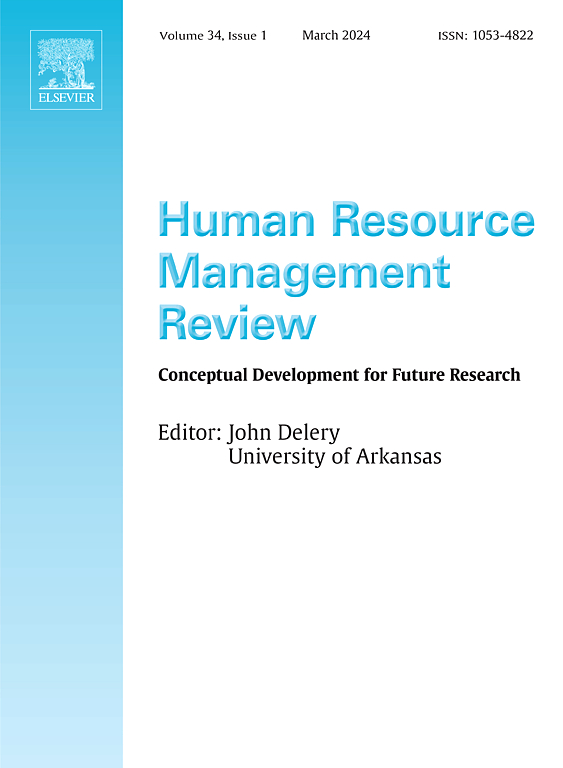What sparks team learning? Refining the conceptual understanding of team learning and learning triggers
IF 13
1区 管理学
Q1 MANAGEMENT
引用次数: 0
Abstract
Teams and their capacity to learn are considered key cornerstones of organizational success. Research on team learning has substantially grown in recent years, with studies identifying a myriad of positive outcomes and key antecedents. Despite these advances, empirical research remains fragmented due to persistent conceptual ambiguities. Team learning has been conceptualized in numerous ways, encompassing a wide variety of distinct learning behaviors, with limited integration. Moreover, although antecedents and boundary conditions have been extensively investigated, a unified understanding of how team learning is initiated remains unaddressed. This paper presents a systematic review analyzing 239 empirical studies on team learning to address these issues. We introduce a trigger-based process model examining how learning is initiated and unfolds over time, accounting for the vast diversity of learning conceptualizations, theoretical perspectives, and empirical findings in the field. Based on this model, we identify important opportunities for future research on team learning.
是什么激发了团队学习?细化对团队学习和学习触发器的概念理解
团队及其学习能力被认为是组织成功的关键基石。近年来,关于团队学习的研究大幅增长,研究发现了无数积极的结果和关键的先决条件。尽管取得了这些进展,但由于概念上的模糊性,实证研究仍然支离破碎。团队学习已经以多种方式概念化,包括各种不同的学习行为,有限的集成。此外,尽管前因和边界条件已被广泛研究,但对团队学习如何启动的统一理解仍未得到解决。本文对239项关于团队学习的实证研究进行了系统回顾分析,以解决这些问题。我们介绍了一个基于触发器的过程模型,该模型研究了学习是如何随着时间的推移而启动和展开的,并解释了该领域学习概念、理论观点和实证研究结果的巨大多样性。基于这个模型,我们确定了未来团队学习研究的重要机会。
本文章由计算机程序翻译,如有差异,请以英文原文为准。
求助全文
约1分钟内获得全文
求助全文
来源期刊

Human Resource Management Review
MANAGEMENT-
CiteScore
20.20
自引率
7.00%
发文量
0
审稿时长
48 days
期刊介绍:
The Human Resource Management Review (HRMR) is a quarterly academic journal dedicated to publishing scholarly conceptual and theoretical articles in the field of human resource management and related disciplines such as industrial/organizational psychology, human capital, labor relations, and organizational behavior. HRMR encourages manuscripts that address micro-, macro-, or multi-level phenomena concerning the function and processes of human resource management. The journal publishes articles that offer fresh insights to inspire future theory development and empirical research. Critical evaluations of existing concepts, theories, models, and frameworks are also encouraged, as well as quantitative meta-analytical reviews that contribute to conceptual and theoretical understanding.
Subject areas appropriate for HRMR include (but are not limited to) Strategic Human Resource Management, International Human Resource Management, the nature and role of the human resource function in organizations, any specific Human Resource function or activity (e.g., Job Analysis, Job Design, Workforce Planning, Recruitment, Selection and Placement, Performance and Talent Management, Reward Systems, Training, Development, Careers, Safety and Health, Diversity, Fairness, Discrimination, Employment Law, Employee Relations, Labor Relations, Workforce Metrics, HR Analytics, HRM and Technology, Social issues and HRM, Separation and Retention), topics that influence or are influenced by human resource management activities (e.g., Climate, Culture, Change, Leadership and Power, Groups and Teams, Employee Attitudes and Behavior, Individual, team, and/or Organizational Performance), and HRM Research Methods.
 求助内容:
求助内容: 应助结果提醒方式:
应助结果提醒方式:


